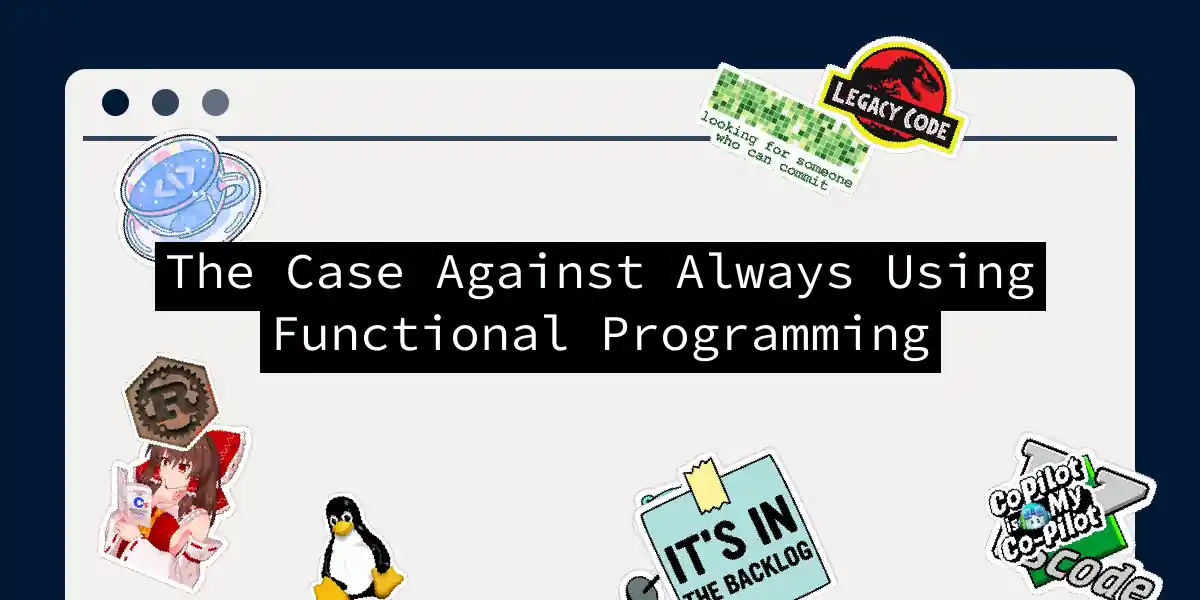The Allure and the Pitfalls of Functional Programming
Functional programming has been the darling of the programming world for quite some time now, and for good reasons. It promises cleaner, more testable, and more maintainable code. However, like any other programming paradigm, it is not a one-size-fits-all solution. In this article, we’ll delve into the reasons why you might want to think twice before diving headfirst into the world of functional programming.
The Steep Learning Curve
One of the most significant barriers to adopting functional programming is its steep learning curve. For developers accustomed to imperative or object-oriented programming, the shift to functional programming can be daunting. The concepts of immutability, higher-order functions, and recursion require a different mindset and a lot of practice to master[2].
Imagine trying to learn a new language; it’s not just about memorizing words and grammar rules, but also about understanding the cultural context and nuances. Similarly, functional programming demands a deep understanding of its principles and practices, which can be time-consuming and frustrating for beginners.
Performance Concerns
Functional programming languages often prioritize correctness and safety over raw speed. This is because the abstractions that make functional programming nice to use can also make it slower. For instance, the use of recursion instead of loops can lead to higher memory usage and slower execution times, especially if the compiler does not optimize the recursive calls into loops[4].
Debugging Challenges
Debugging functional code can be a nightmare, especially for those who are used to the more straightforward approach of imperative programming. The lack of side effects and mutable state means that traditional debugging techniques, such as printing variables at different points in the code, are less effective. This forces developers to rely more on logical reasoning and understanding of the code’s flow, which can be challenging, especially when working on complex problems[2].
Limited Tooling and Libraries
While functional programming languages are gaining popularity, they still lag behind imperative languages in terms of tooling and library support. This can make it harder for developers to find resources, libraries, and community support when they encounter issues. For example, if you’re working with a functional language like Haskell, you might find that you need to write more glue code to integrate with external libraries, which can be time-consuming and frustrating[2].
Real-World Limitations
Functional programming is not always the best fit for real-world applications, especially those that require interactions with databases, servers, or other external systems. The stateless nature of functional programming makes it less suitable for tasks that involve changing state or performing I/O operations. For instance, retrieving large amounts of data from a database or handling complex network requests can be more efficiently managed using imperative or object-oriented approaches[1].
Concurrency and Parallelization
While functional programming languages often have built-in support for concurrency, this does not always translate to better performance in practice. The overhead of managing immutable data and the complexity of handling side effects can sometimes outweigh the benefits of parallelization. Additionally, the need to allocate and deallocate memory for each function call can lead to performance issues if not managed properly[4].
The Human Factor
Let’s not forget the human element in software development. Functional programming requires a certain level of discipline and mental effort that not all developers are comfortable with. It’s like trying to solve a puzzle; it’s rewarding when you finally get it right, but it can be frustrating when you’re stuck. This can lead to burnout and decreased productivity, especially for developers who are not well-versed in functional programming principles[4].
When to Use Functional Programming
Despite the challenges, functional programming is not without its merits. It shines in scenarios where testability, verifiability, and concurrency are crucial. For example, in the development of parsers, compilers, or other software components that require precise and efficient processing of large data sets, functional programming can offer significant advantages[1].
Conclusion
Functional programming is a powerful tool in the programmer’s arsenal, but it is not a silver bullet. While it offers many benefits, such as cleaner code and better testability, it also comes with its own set of challenges. The steep learning curve, performance concerns, debugging difficulties, and limited tooling and libraries are all factors that need to be considered before deciding to use functional programming.
In the end, the choice of programming paradigm should be based on the specific needs of the project. Sometimes, a mix of different paradigms can provide the best solution. By understanding the strengths and weaknesses of functional programming, developers can make informed decisions and write better, more maintainable code.
So, the next time you’re tempted to dive into the world of functional programming, remember: it’s a tool, not a religion. Use it when it makes sense, and don’t be afraid to mix it up with other approaches. After all, the goal is to write good code, not to follow a particular dogma.
